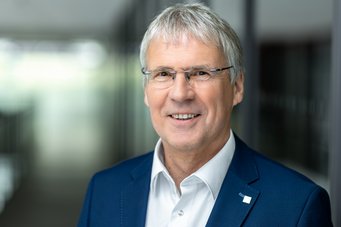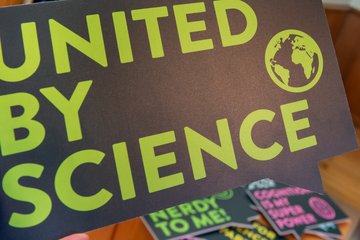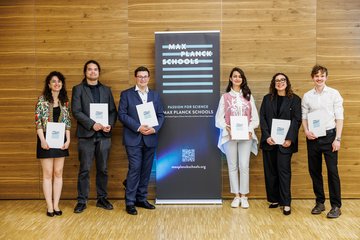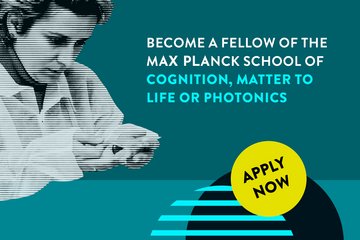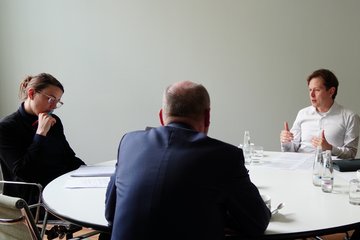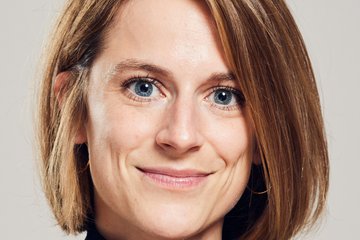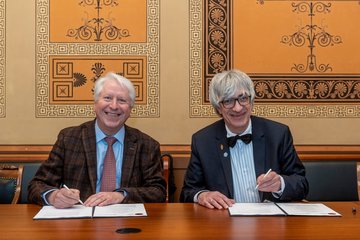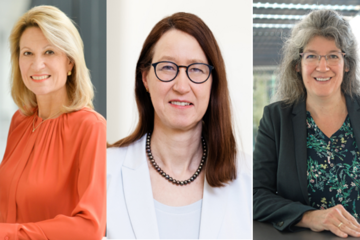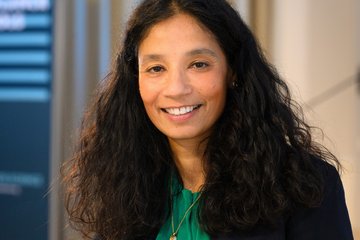“Excellent training is a key factor”
Interview with Fraunhofer President Holger Hanselka
With an impressive career in science and innovation, Holger Hanselka is a name that is inextricably linked to the German research landscape. As the former President of the renowned Karlsruhe Institute of Technology (KIT), one of the nine teaching universities of the Max Planck Schools, the mechanical engineer headed one of Germany's leading universities for many years. In 2023 he became President of the Fraunhofer Society in a role that is also crucial for the Max Planck Schools: heading one of the many key partners of the program. Certainly enough reasons to interview Holger Hanselka for our website!
The Max Planck School of Photonics is an outstanding example of dovetailing research and application. When you first heard about the idea to create a graduate program with a nationwide character – what were your thoughts?
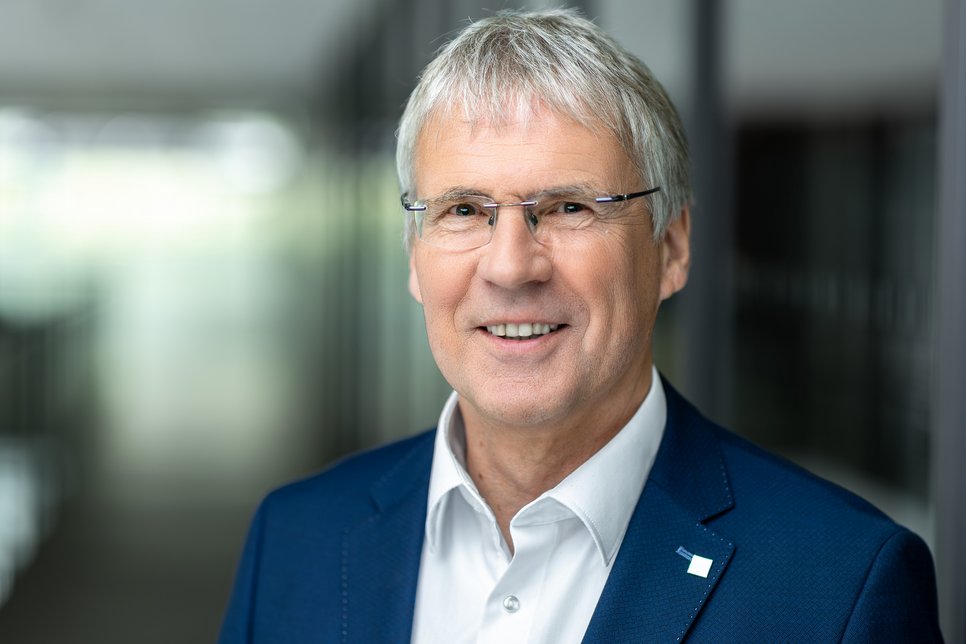
As an enabling technology, photonics has enormous interdisciplinary potential in science and industry. We have numerous interfaces where photonics is a key technology, such as light as an information carrier in the analysis of processes or materials – and corresponding examples can be found in almost every scientific and economic discipline. Right from the start, but also and especially today as President of the Fraunhofer Society, I am inspired by the focus on the application of science. The approach of promoting young talent in the field of photonics is consistent, logical and an investment in our future. If we want to advance economic performance and added value in the interest of society, excellent scientific training is key factor.
The MPS Photonics, with its speaker Andreas Tünnermann, is directly linked to the Fraunhofer Institute for Applied Optics and Precision Engineering IOF and the overall photonics ecosystem in Jena. Photonics has long been considered a key technology and therefore requires excellently trained scientists and specialists. What do you think the future holds for this highly interdisciplinary research field?
Photonics is a key technology, which in many fields is crucial to accomplish things faster, better or even more accurately. With the appropriate solutions, we save time, money, and other valuable resources. This field of research will continue to help us push boundaries in the future: we will be able to work with even shorter light pulses, fit more and more energy into ever smaller light packets, use new effects and so on. That is in the nature of this specific field of science and what makes it so special.
And what role do you think excellent training plays at early stages in a scientific career, such as at the Max Planck Schools?
On the one hand, at the MPS we have training in an interdisciplinary environment and focus on a broad research orientation at a very early stage of the Master's program. This has a decisive impact on how PhD candidates embark on their doctorate and develop their research topics: they have a very broad and open view on topics that are otherwise usually rather limited in scope.
The Max Planck Schools bring together a range of research fields or topics and link them to the relevant centers of expertise. We have fundamental research in which completely new approaches are expanding the boundaries of what was previously thought possible. This is taught by excellent Fellows and even Nobel Prize winners such as Ferenc Krausz and Stefan Hell, who also pass on their motivation to PhD candidates and serve as role models: what mindset is required for such a career, and what can those who choose this path expect? At the MPS, young talent gains direct access to a broad range of topics in a network that spans the entire country. This is an invaluable opportunity for all those involved – not least for Germany as a center of industry and science.
You often talk about the importance of the circular economy and advocate for an open approach to technology and a responsible use of our resources. In what way do you think science should take responsibility in this context, or in general when it comes to tackling global challenges?
Our global challenges can only be overcome with the contributions from modern science. And science has already achieved outstanding results in a comparatively short period. Think of photonics and LEDs, which take such a broad topic as light and make it more resource-efficient and ultimately more sustainable – not in some distant realm far away from people's everyday lives, but in every single household. Energy efficiency, improved manufacturing processes, new procedures and materials – with innovative approaches, we are able to conserve our resources and combat climate change, but also to face global crises such as the COVID-19 pandemic. To achieve this, cross-disciplinary research, scientific networks, and multilateral exchange are crucial. This also applies to the ecological and digital transformation.
In all of this, we must always be aware of the responsibility that comes with our work. We must stand up for freedom of science and research in a world of increasing global competition, systemic rivalries and geopolitical uncertainties. It is also always about standing up for our own values and principles. To do this, we must be and remain politically and technologically sovereign in a highly globalized environment. Only then will we be able to successfully counter, across national borders, the challenges of our time.
In your opinion, how can young scientists, such as PhD candidates at the Max Planck Schools, contribute to this?
The Max Planck Schools recruit internationally – young people from different cultures. Even simply bringing together this pool of diverse perspectives and experiences provides valuable impetus, adding value to our society as a whole with the tailor-made solutions it produces. The PhD candidates are highly motivated. They want to change things and are very open-minded when it comes to finding new approaches or ideas. Programs such as the Max Planck Schools offer them ideal platforms and opportunities for exchange so that they can be creative and network with other experts.
Last year the Schools were evaluated by an international panel of experts and found to be excellent in terms of their scientific quality and contribution to the German system of science and research. Which challenges do you see for the further development of the program in the coming years?
The Max Planck School of Photonics pools the expertise of the photonics community and promotes highly talented young scientists at a world-class level. The program was launched in 2018 with the declared aim of competing as graduate school internationally with Ivy League institutions such as Harvard University, the Massachusetts Institute of Technology (MIT) in the US and other comparable organizations in the UK or China.
The MPS Photonics is internationally recognized. Nevertheless, it remains a challenge to further build out this reputation. It takes time for a brand to establish itself. It is therefore crucial to strengthen this position and, at the same time, the German system of science and research as a whole. Furthermore, it is important to constantly develop the program scientifically. Fellows within the program, who are experts in their field and supervise the PhD candidates, are reappointed for a limited period only. This ensures the diversity and further development of research topics. However, it is also essential to identify and attract the right people for this role: pioneers who are open to embracing new technologies and who do not only have an academic career in mind, but could also see themselves in industry or founding their own start-up.
To conclude, as the former President of the KIT you were able to help establish the Schools Program back in 2018. Where would you like to see the Max Planck Schools in ten years' time?
In fact, it is truly amazing to see how the Max Planck School of Photonics has developed - from its origins at the Karlsruhe School of Optics and Photonics at KIT to the present day. I think we are on the right track. We have brought together brilliant talent at the Max Planck Schools, but we can never have enough such excellent minds. That means our goal must be to give an even larger number of people the opportunity to start their scientific career in our program, to further train them, and to attract even more high-potential candidates from across the globe. We are now seeing the first graduates who have taken the next step in their careers. They will all continue to thrive, and I am sure they will become figureheads and ambassadors for the MPSP. Their initiatives will produce numerous companies and ventures addressing, and helping to solve, relevant problems of our society – and will do so in academia, industry and in many start-ups.
Holger Hanselka has been President of the Fraunhofer Society since August 2023. Prior to this, the mechanical engineer held various positions, such as researcher at the German Aerospace Center (DLR), Professor of Adaptronics at the University of Magdeburg, and subsequently Director of the Fraunhofer Institute for Structural Durability and System Reliability as well as vice president at the Technical University of Darmstadt. Ultimately, he became President of the Karlsruhe Institute of Technology in October 2013.
